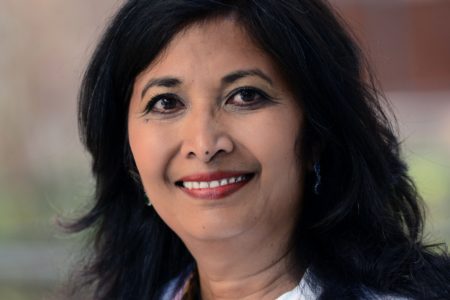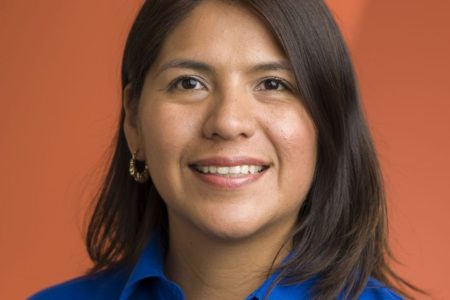Share On Social!
Latino youth are facing a rising diabetes crisis. Many lack support needed to manage their disease.
That’s why Dr. Siripoom McKay of Baylor College of Medicine and Texas Children’s Hospital helped create the Young Adult Diabetes Clinic to provide a medical home for diabetes management and support for Latino and all young adults.
The program helps young adults ages 17-26 who may have been relying on parents for practical things like picking up their medication, setting appointments, and dealing with insurance.
Young adults get connected to a physician, dietician, psychologist, social worker, and diabetes educator without parents to make sure they’re ready to go off on their own. This makes a smooth transition as they go out on their own and manage the chronic illness like diabetes alone for the first time, said McKay, professor of pediatrics at Baylor and Texas Children’s Hospital.
“Our goal is to make them independent of their parents or guardians eventually, and most parents and patients have that as a goal as well,” McKay said.

Latinos and Diabetes
Latinos are at far higher risk for diabetes than non-Latino whites.
A landmark study found that rates vary within U.S. subgroups. Rates range from a high of 18.3% for those of Mexican descent to a low of 10.2% for people of South American descent. Also, 18.1% of people of Dominican and Puerto Rican descent, 17.7% of Central American descent; and 13.4% of Cuban descent had type 2 diabetes.
There are many reasons for the high diabetes rates among Latino adults and youth, including living in food swamps, less physical activity, unhealthy diet, more sugary drinks, and more. Even air pollution is linked to diabetes in Latino kids.
Prevention is critical. But for those who already have diabetes, how can they make sure to manage the disease properly?
That’s a question McKay wanted to address.
Why Young Adults Need Help
Young adults with diabetes have different health needs than pediatric patients or older adult patients.
They may face new lifestyle challenges as they transition from pediatric to adult care, McKay said.
For example, it’s important to educate young adults about alcohol and effect on diabetes. Drinking alcohol can make managing blood sugar levels trickier, and increase your risk of hypoglycemia, symptoms of which mimics the signs of intoxication and hence heavily mislead, McKay said. She encourages patients to eat something before drinking, and have a friend they trust to look for signs.
The program also educates women about contraception and pregnancy.
Pregnancy with diabetes carries a risk of birth defects, especially within the first trimester, without proper precautions, McKay said. In many cases, women with diabetes may get pregnant and not know until after birth defects have happened. Education is thus a big need.
Young adults with diabetes also need help understanding the different schedules for insulin, new glucose monitoring technology, like continuous glucose monitoring, or medication delivery devices such as the insulin pump, McKay said.
Practical and legal considerations, like communicating with close friends, roommates, employers and college professors or advisors about the disease is also very important. The programs promotes these interactions and knowledge.
Dr. McKay’s Program
Diabetes self-management education and support is a critical element of care for all people with diabetes.
McKay’s program follows the standards of the American Diabetes Association.
The patient care team at the Young Adult Diabetes Clinic at Baylor College of Medicine includes McKay, adult endocrinologists as well as a dietitian, psychologist, social worker, and Nelly Miranda, a certified diabetes educator .
McKay and Miranda ensure that most patients see the clinic’s care team every three months. McKay said appointments will be available when young adults most need them, such as over holiday and spring breaks.

Miranda said that the program also educate the patients to navigate the health insurance realm, and understand the medical insurance terms like co-payment, out of pocket and deductible. The programs also guide the young adults and their parents or guardians to understand how the changes in insurance policies could affect their treatments.
The program also ensures it can work with Spanish-speaking young adults.
Spanish-speaking and other Latino young adults are often closer to their family, so the program promotes bilingual diabetes education and address related issues among all family members.
McKay and Miranda have been overwhelmed by the results of this program.
They get many requests from other institutes and organizations to replicate similar programs across the country, as young adults with diabetes may face many new lifestyle challenges as they transition from pediatric to adult care across the country.
“At Baylor’s young adult diabetes center we have an inclusive team in place to meet all the needs of our young patients, from their medical needs to practical tips for staying healthy while managing life away from home for the first time,” Dr. McKay said.
By The Numbers
25.1
percent
of Latinos remain without health insurance coverage
This success story was produced by Salud America! with support from the Robert Wood Johnson Foundation.
The stories are intended for educational and informative purposes. References to specific policymakers, individuals, schools, policies, or companies have been included solely to advance these purposes and do not constitute an endorsement, sponsorship, or recommendation. Stories are based on and told by real community members and are the opinions and views of the individuals whose stories are told. Organization and activities described were not supported by Salud America! or the Robert Wood Johnson Foundation and do not necessarily represent the views of Salud America! or the Robert Wood Johnson Foundation.



